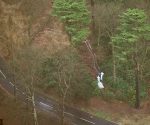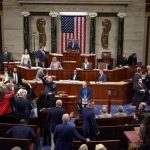National Action series, Part Five: featuring Jack Renshaw and the dangerous rubber duck principle
In a previous part of this now five-part series on National Action (all parts being linked to at the foot of this page), a pledge was made to return to the matter of Jack Renshaw, a character who has twice dodged unsuccessful attempts made against him by the Crown to convict him as a member of a proscribed organisation contrary to section 11 of the Terrorism Act 2000 (i.e. a member of National Action). Mention was first made of Renshaw in these pages in conjunction with a trial of six men charged with having National Action membership. The trial terminated in July 2018 with two of the six being found guilty – these were Christopher Lythgoe and Matthew Hankinson – one being found not guilty, and with the jury being unable to decide on the fate of three others – one of which, of course, was Jack Renshaw.
In April this year, the three were tried again, and a jury once more would not come to a decision. Subsequently, the trial judge ruled that enough was enough, and acquitted them. However, Renshaw was not out of the woods. At the commencement of the 2018 trial, he admitted to plotting to kill the West Lancashire Labour MP, Rosie Cooper. At the time of the cessation of this first trial, the author remarked that no news of his sentencing could be found – and now we discover why. It appears that Renshaw was sentenced for his murder plot, or “preparing an act of terrorism”, as it has been styled, at the end of his retrial for National Action membership. On the face of it, this seems an odd thing to do (for surely Renshaw would have to be jailed for the crime he admitted to at the first trial) – until one discovers that he was in fact already in prison at the time (which explains why he wasn’t named in the corporate-media reporting of the trial). As such (and not knowing any explanation for it), we might suppose that the Crown, having him at its leisure anyway, decided that the sentencing of Renshaw could be saved for the purpose of a news agenda timetable – as if the old conviction would make good substitute, in terms of headlines, for not having been able to gain a new conviction. Renshaw was cooperative in these regards, and very kindly made a newsworthy show at his sentencing hearing by throwing up a cartoonish Roman salute.
Of Renshaw’s sentencing, one can only say that it was remarkable: a life sentence, having to serve twenty years before being eligible for parole, despite having pleaded guilty to the charge, and saved the Crown a lot of bother of having to prove a no-detail assassination plot – and further undermining its own authority by once again validating the “dangerous rubber duck principle”. The dangerous rubber duck principle is primarily when a suspect chooses a weapon that can’t perform as he would design it to – thus severely restricting any capability to carry out an attack, thus raising questions about the suspect’s real intention to do it or his psychological state. However, the principle also applies to choices about how an attack is to be carried out. A man with a machete might as well have a rubber duck with which to kill a politician if his plan to do it only exists or works as a delusion (see here for an explanation). Evidently, Renshaw didn’t have a plan. So, to say he was helpful by admitting guilt is an understatement. His punishment absolutely points to him not being bona fide as a persona in the context of the genuine judicial system. It points to him being a show-trial participant in that detached corner of the justice system, principally staged at the Old Bailey, whereby things are definitely not what they appear to be, and rulings are made for political effect without recourse to real judicial proceedings.
Renshaw’s plot to attack an MP came to light because there was a meeting of people in Friar Penketh pub in Warrington on 1st July 2017, and one person there was, essentially, a mole for Hope Not Hate – although of course this circumstance is presented in terms of Robbie Mullen, the individual in question, having become disillusioned with his affiliates (“particularly after the murder of Jo Cox” – but of course) but nevertheless choosing not to go straight to police with information about a murder plot. Quite remarkably, at the same time as he associated with people the Crown would later try as National Action membership, Mullen had “contacts at Hope not Hate”, to whom he would report. Quite bizarrely, the police were the last in a long line of folk to know about Renshaw’s plot, as the BBC reports:
Hope not Hate director Nick Lowles alerted the MP Ruth Smeeth – who once worked at the charity – and she in turn warned Ms Cooper, leading to the police inquiry, Mr Atkinson said.
Of course, it must be pointed out that Renshaw’s plot was not actually a plot, but his own idea that the Crown was not able to prove had received any kind of welcome or encouragement by the others present at the meeting – principally Christopher Lythgoe, who was charged with encouraging Renshaw – whereby they could consequently be tried and convicted as conspirators, which actually doesn’t speak positively for Renshaw’s guilt. Apparently, during the course of his disclosure, Renshaw revealed that he had purchased a knife (“a 19-inch (50 cm) long machete… later found at his home”), and in all the reporting that the author has seen, there is no more detail than this in regards about how Renshaw hoped to realise his design. It would not be surprising, then, if his plan was 100% aspiration, 0% timings and diagrams, that it couldn’t find any fertile ground with the National Action leadership from whom he was seeking some kind of a blessing. As such, it begins to appear that any trial where Renshaw’s plan had to be proved would not go as easily as the Crown would have required; if the reader is reading this article, he will have the capability to understand that there is a world of difference between uttering a wish, and then generating a situation whereby it can be fulfilled (whereas producing a direct threat is a different case again). All the Crown had on Renshaw, other than his admission, was that he had previously bought a big knife. Big deal. When did he intend to use it? How would he get close to his target? Did he have knowledge of his target’s itinerary so that he could intercept? Surely only corporate-media “journalists” and police are not left feeling that it was very convenient for the Crown that Renshaw admitted to his murder plot.
Moreover, the impulse that one of these (what are essentially) show trials provokes in a mere mortal such as we, dear reader, is to wonder at sheer amazement at the ability of that supposedly supremely clever race of being that is the lawyer or solicitor – particularly the defence attorney. All things being equal, in a proper country, not one of them would be valued enough to make a living, let alone £1000 and more per hour. Arguably, persuading Renshaw to plead guilty (the BBC says that he changed his initial plea) potentially could have been part of a strategy for bargaining utilising a flaw in Renshaw’s character to mitigate his treatment – and yet, judging by his very harsh sentence, no such thing materialised. For it transpires that just before Renshaw pleaded guilty to preparing an act of terror on 12th June, 2018, he was convicted on “four counts of inciting a child to engage in sexual activity” at Preston crown court, and sentenced to 16 months in prison.
Although it had been done and dusted, Renshaw’s trial and conviction for communicating online in whatever particularly sordid way his crime amounted to, was not raised during his National Action trial – and one could argue that as the one case did not have any bearing on the other, and that knowledge of Renshaw’s previous conviction could have prejudiced the court, there was no need. However, one also can’t help but wonder that if Renshaw had forced the Crown to prove that its murder plot accusation amounted to more than the imaginings of a fantasist, his sex offences might have been relevant as indicative of his not being “right in the head”. Even if it was possible, Renshaw didn’t have the defence team to pull it off – and of course he wouldn’t.
Indeed, the author is left feeling that Renshaw’s internet paedophilic dabbling was all about getting him to the dock, after which it could become irrelevant. The online activity that Renshaw supposedly engaged in happened between February 2016, and January 2017 – and his defence at his trial was that his phone had been hacked. Fascinatingly, he blamed Hope Not Hate. Perhaps we should take Renshaw seriously if the Crown wants us to buy into that version of reality where he isn’t deluded, and where he is a calculating villain. And let us not forget that Renshaw did evidently hang around with someone who, as it turned out, had contacts with Hope Not Hate, and who went running to them with a murder plot story (instead of going directly to police). So would “Hope Not Hate” have the opportunity to access his phone? Let us only answer with another question: could Government, with all the resources at its disposal, possibly have framed Renshaw?
To help the reader’s rumination, let us gain a complete picture of Renshaw’s activity that would have made him liable to get in trouble with the authorities. It transpires that in March 2016 and onwards, Renshaw was attracting attention to himself for inciting racial hatred in his public oratory. By November 2016, according to the Wikipedia entry dedicated to him, there was a distinct possibility of Renshaw facing criminal charges in these regards (he was eventually convicted on two counts in early 2018).
And so it appears that we are supposed to believe that at the same time (just before, in fact) as Renshaw was tempting the authorities to act in response to his “extremist” political activism, he decided to approach children on the internet as a sex pest. If the reader is thinking that what the latter actually constitutes is leverage to coerce Renshaw to take part in a course of the former, then he would be sharing the same thought with the author.
Indeed, Renshaw’s career as pervy-internet-botherer doesn’t need to have been fabricated, as he claims it was. If we suspected it before, then the Salisbury poisoning psyop of 2018 firmly opened observant eyes to the tactic of Government to exploit vulnerable people into participating in an operation using leverage brought about by their involvement in petty crime or being on the fringes of society. On the other hand, if Renshaw did indeed make a Roman salute in court on the occasion of the sentencing for his no-detail murder plot, he appears to be a dedicated contributor to his own vilification. It then becomes very easy for the Huffington Post, for instance, to describe the culmination of that trial with the headline: “Jack Renshaw, Neo-Nazi Paedophile, Jailed For Life Over Plot To Kill Labour MP”.
If one thing is for sure, we are not going to know the truth about if and how much Renshaw signed up as, what we might call, an intelligence asset to do a job, and then had his deal reneged upon as Government saw fit, or if he himself got cold feet – consequently requiring measures to be taken to keep him on track in his mission. We note with great interest that in May 2015, he “pulled out from speaking [at a protest against the ‘Jewification of Britain, etc’ at Golders Green] because he was supposed to be at work”. So, in fact, we can see that Renshaw’s career (discounting the election canvassing he did for the BNP) as “neo-nazi” street orator was planned to start earlier than it apparently did, but was delayed by a flimsy excuse – did not he know that he would have been at work when he booked? But if we sense from this that Renshaw may have been a reluctant participant, other information suggests that he may have been happily following orders to be objectionable as possible to give as much scope for character assassination as could be conceived (see the Huffington Post headline, above).
It appears that Renshaw’s career at Manchester Metropolitan University may well contain the key to all the doubts and questions that have here been raised – although from the outset it is clear it cannot be fully discoverable from our position. Be that as it may, we know that at Manchester, Renshaw studied economics and politics – a course of study, then, that is usually packaged as Philosophy, Politics and Economics (PPE), and is the stuff which has equipped lots of the modern politician (or enabled them to be singled out as candidates) for going straight into junior-level posts for national parties, quickly then to be promoted into very high-level roles in Government. For Renshaw, it was the BNP: he became the face of its youth division. In fact, Renshaw’s Wikipedia biography said that he was forced to leave university in September 2015 in relation to his political activity – and we must assume that what is meant is that he was not allowed to commence the 2015/16 academic year.
However, there may be a good reason not to trust the dates in respect of Renshaw’s career, and this is because his biography would have him commence university in September 2013, when he would have been 17 or 18, depending on whether or not his birthday fell before or after the start of the first semester. The author argues that this was a year too young to go to university, or Renshaw was precocious – which, combined with turning up on an economics and politics course, was perhaps too much temptation for any on-campus recruitment agent. Indeed, Renshaw evidently joined the BNP in 2010, “against his parents’ wishes” – the fecklessness is believable, although we can certainly question how his interest in the BNP would therefore germinate without parental leading to it. We note with interest that, according to the Wikipedia account, it would have been Renshaw’s third year at university when he started to agitate on the streets, and there doesn’t seem to be any detail in his biography about how he would have supported himself at this time – except the one nebulous reference to work in May 2015.
At university, Renshaw had an ambition to join the British Army. This is according to Wikipedia – and we note it well, although the claim is not supported by referenced material. Moreover, there is no indication of how serious the intent was – telling friends and family is one thing, but that wouldn’t tangibly demonstrate a commitment as would, for instance, joining the University Officer Training Corps. It would be interesting indeed to discover in Renshaw was in fact a trainee officer, because it has been speculated in these pages that another character centrally placed in this National Action psyop was one too. Alexander Deakin’s name has also cropped up in the latest failed attempt to convict National Action membership (a court case that has very recently ended where once again a jury could not come to a decision) – the author suspects that he has been the means by which a lot of useful idiots have been incriminated. And, if we interpret Renshaw’s announcement of a plan to kill an MP, at a meeting of his associates, as an attempt to embroil others in a conspiracy, then we could begin to see him as a honey pot for entrapping the unwary too. Indeed, the way that a particular Telegraph article has been written, it appears that all of Renshaw’s internet-sex-pest troubles might have been meant to act as motivation for others to get involved in a campaign of revenge:
But the 23-year from Skelmersdale in Lancashire, told other members of the extremist group that he had been set up by the police and left wing campaigners who wanted to discredit him.
He then sought the group’s permission to take revenge by murdering the MP and also the female police officer who had arrested him.
We should also notice that Deakin and Renshaw are roughly contemporaries at university – as best we can according to the information available. Deakin looks as if he started university in 2014, because when Deakin was appearing in court alongside Mikko Vehvilainen and Mark Barrett, he was described as a civilian university graduate (although, of course, it had also been hinted at that he was serving in the Army), and he was 22 years of age – so we can suppose that his university career ended in 2017. If they were at different academic institutions, it wouldn’t matter for organisational purposes if Renshaw and Deakin were both in the Army training programme – if they were in it.
Moreover, we should notice that Renshaw, at least, was contemporary at university with Alex Davies, “who withdrew from a first-year course in philosophy at Warwick University in June 2014 after his involvement in National Action was revealed” (from the Wikipedia entry on National Action). Davies is also a former Young BNP member, and is accredited with being a co-founder of National Action in 2013, although he has never been charged with National Action membership.
Incidentally, it’s very interesting to note the start date of National Action, and understand that it was the same year as the hoax that was staged out of the Army barracks in Woolwich – which was a precursor to the grand ISIS hoax in Syria. More pertinent, 2013 was the same year as the incident at the Boston Marathon about which there was evidence (all scrubbed from, or apparently hiding in unsearchable corners of the internet) to suggest that blame for it was somewhat hastily foisted on the Tsarnaev brothers, and that in fact it appeared to have been executed with the initial notion of blaming it on a “right-wing” extremist, Timothy McVeigh character . It would then have been the reference point for threat against which the emergent National Action could be measured, rather like the head-chopping ISIS (another gift from the British military) could live in the public imagination after the incident at Woolwich.
It is with great interest that we should note how recently a document was “leaked” from the British Army that had supposedly been circulated to serving personnel to ask them to be on the lookout of signs in colleagues of something it called radicalisation into the extreme right wing. Evidently – on the face of it, at least – it is an incentive to discourage the expression of certain political view points, some of which are fairly reasonable or harmless (of course, for those ideas must be demonised), with the threat of being snitched on by other non-thinking automatons that fear punishment from their bullying sergeants for not telling tales to their officers. Well, that would be for the surface impression – in reality, there is a term for what the Army would be doing here, which is creating plausible deniability – that is, creating circumstances whereby it could deny in a believable way the engineering of a phantom menace that it appears to have had a major role in deliberately, not accidently, creating.
National Action series:
More divide & conquer “right-wingery”: National Action illusion; UKIP’s AMW infiltration (Part One) – (link)
National Action series; Part Two: the Army and the “Midlands” Five – (link)
National Action Series; Part Three: honey trapped, and tarred by the same brush – (link)
National Action series; Part Four: more Army connections, confirmed and suspected – (link)
Other further reading:
UK Government’s Cointelpro, 2019 version; the role of Hope Not Hate and “Tommy Robinson” in it – (link)


















